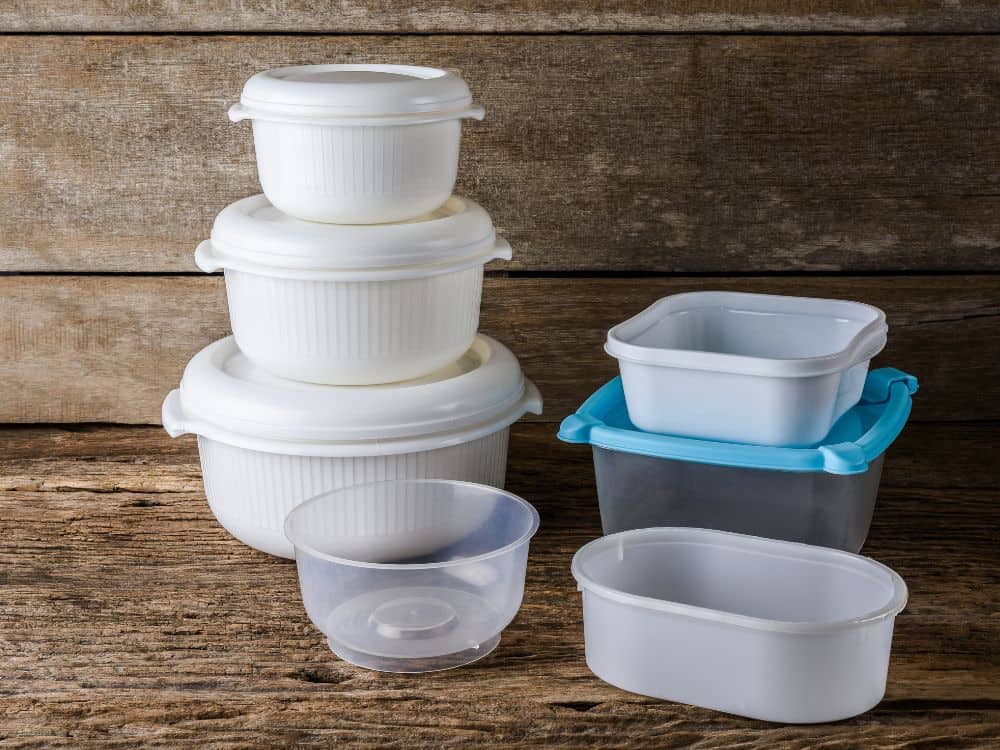
Blowing The Lid Off What To Do With Old Tupperware
We’d hazard a guess that the least organized cabinet in your kitchen is crammed with stacked plastic containers and, since you’re environmentally conscious, an old glass jar or two (ok maybe ten).
The clutter of it all can leave you wondering what to do with old tupperware that’s past its prime.
Wait, does old Tupperware go bad?
It sure does, which means it’s not just a matter of decluttering, but decontaminating your eating rituals.
Whether you’re wanting to part with a Tupperware®-brand item or a piece of plastic that falls under the generic Tupperware umbrella, we’ve got you covered like leftovers in the microwave.
For motivation to make sure those bits and colorful plastic don’t end up in the landfill, jump to the bottom (or catch the highlights in our video below).
What To Do With Old Plastic Tupperware You No Longer Use
1. Is Old Tupperware Safe To Use For Food?
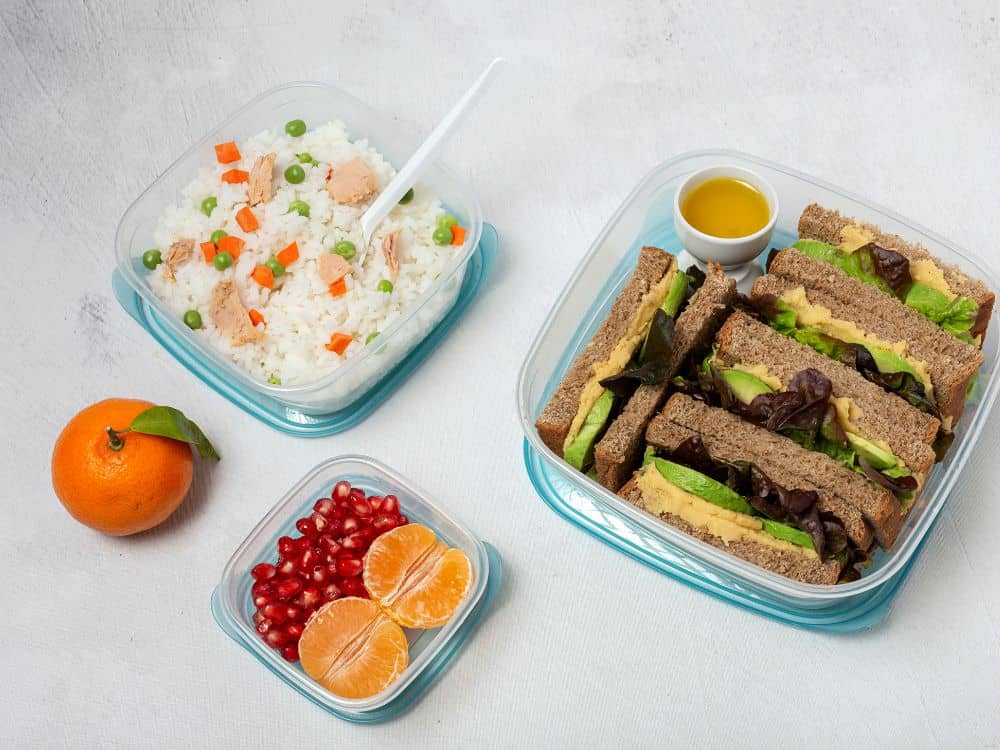
Before we get into your options for recycling old Tupperware containers, let’s talk about when it should leave your home—and when it shouldn’t go into someone else’s.
In other words, when could introduce nasties into someone else’s food.
That would be a bit like donating old underwear…
Does Old Tupperware Have BPA?
If you’re wondering whether old Tupperware is safe for food storage, bisphenol A (BPA) is the first and foremost concern. This is because BPA has been linked to diabetes, hormone disruption, infertility, heart problems, and more.
Try to think back to when you got your Tupperware.
The Tupperware® brand didn’t nix BPA until 2010, and truly vintage Tupperware may even leach heavy metals like cadmium, lead, and arsenic into stored food.
Suddenly those leftovers don’t sound very appetizing…
Ziploc®-brand containers are quoted to have a 5-10 year lifespan, but a good rule of thumb is to assume all older Tupperware is safe, especially if you don’t remember how long you’ve had it.
That means you especially shouldn’t consider old Tupperware microwave safe, either—although it’s arguable that NO Tupperware is microwave safe because heating plastic of any kind causes BPA and phthalates to leach into your food.
Let’s look at a few other signs for when you should replace yours.
Stains & Smells
These don’t necessarily mean Tupperware is unsafe to use. Many plastic food containers are made from polypropylene, which is a porous type of plastic that can absorb colors and odors.
Staining is something you can live with, but if the odor is bugging you, try leaving the plastic container somewhere with its lid off for a few days.
Cracks & Chips
If your old plastic containers have met hard times being toted around—weathering places like kids’ backpacks or the floor of your car—they might be structurally compromised.
If the issue lies on the exterior (say the lid is scratched), you’re probably fine. But if you have a major chip, crack, scratch, or weird texture in the interior, it can trap bacteria or simply leak.
Those abrasions also make it more likely for harmful chemicals to transfer or be indirectly ingested.
2. How To Donate Tupperware Containers
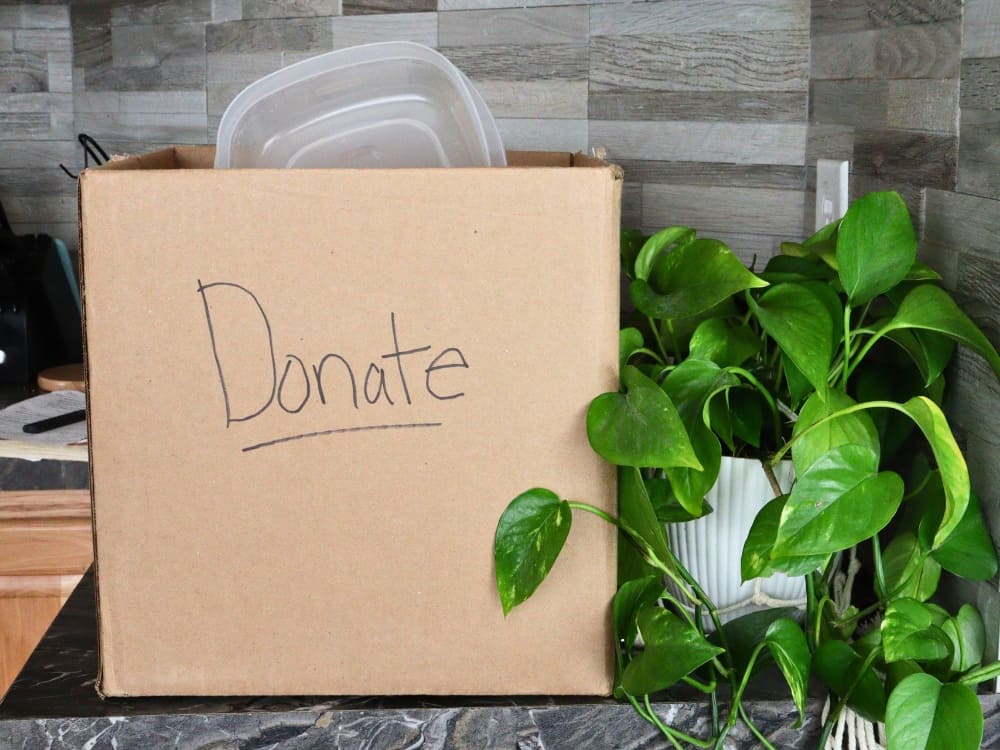
If your Tupperware passed the above tests and you’re wondering what to do with old tupperware containers that are still new(ish) and functional?
Maybe you were gifted a set of new storage containers but had planned to keep using your old Tupperware for a while longer. It might have a useful life with someone else.
If asking friends and family doesn’t turn up any takers there, your local thrift store might take them. Call and ask in advance, though, because some donation centers won’t accept items that risk food contamination.
This goes without saying, but make sure your old Tupperware containers get a thorough clean before you donate them anywhere.
If they have an odor, give them a few days with the lid off to air out before you drop them off. No one wants to buy something that smells like a stranger’s dinner, even if it does only cost a buck or two.
3. How To Recycle Tupperware
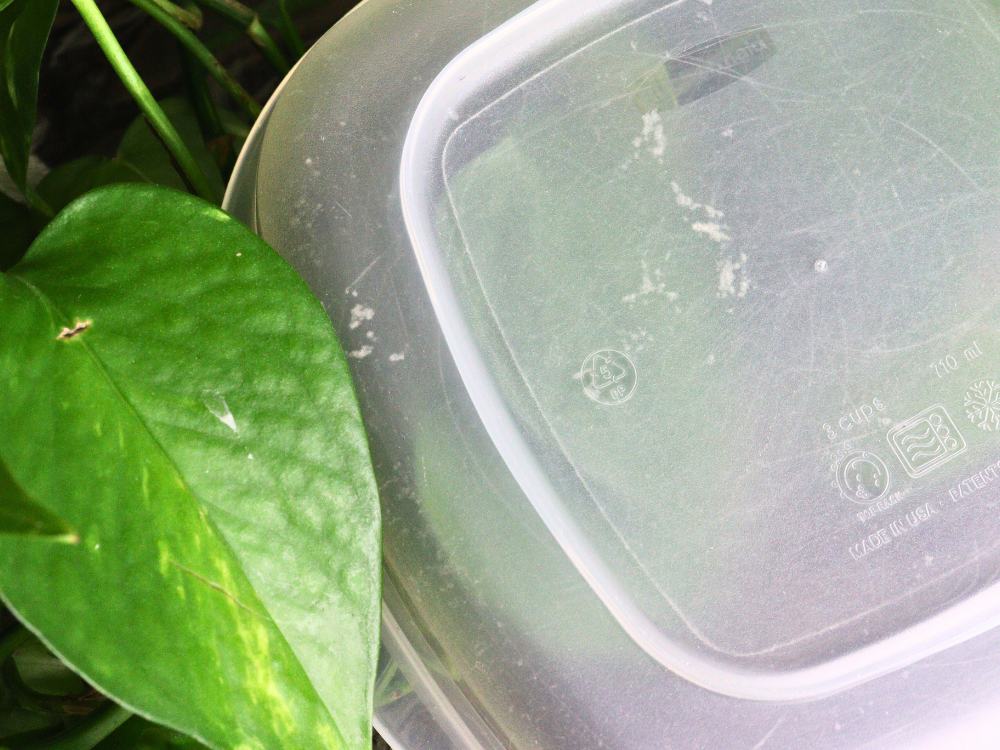
Your first impulse to dipose of too-old Tupperware is likely to recycle plastic storage containers, but is Tupperware recyclable?
In a lot of cases, yes, but that doesn’t mean you can just throw your old Tupperware container in your curbside blue bin.
Just because it’s made of plastic, doesn’t mean recycling programs in your area are necessarily equipped to process it.
And adding items to your recycling because you hope they’ll be recyclable (i.e. wishcycling) can end up being detrimental to your local facilities, slowing down recycling progress across the country and eating into precious resources.
Recycling Tupperware Containers Locally
To find out if your Tupperware material is recyclable, you need to know what type of plastic Tupperware is made from.
Start by flipping it over. Ideally, you’ll see a Mobius loop on the bottom, or the universal recycling symbol, along with a number.
Chances are, you’ll see a #4 (low-density polyethylene) or #5 (polypropylene), though there are always exceptions.
Next look up which plastics your local recycling facility can handle. Metro areas are more likely to take a broader range of plastics, while rural parts of the country might limit what they recycle because the volume isn’t high enough to make economic sense.
Generally, these types of plastic are:
- #1 (PET/PETE) is recyclable
- #2 (HDPE) is recyclable
- #3 (PVC) can technically be recycled, but usually isn’t
- #4 (LDPE) can be recycled but usually requires drop-off at a specific location (e.g., grocery store collection bins)
- #5 (PP) can be recycled, but usually not in your curbside bin and not in rural areas
- #6 (PS) can’t be recycled
- #7 (all other plastics) depends on the type
Do your homework to look up local recycling guidelines, because even if certain types of plastic are recyclable near you, they still might not recycle Tupperware containers.
For example, our local municiple recycling facilities accept plastics #1 (polyethylene terephthalate) or #2 (high-density polyethylene), but ONLY in bottle form, so we still can’t recycle plastic Tupperware there.
If this is the case, there may be a local council or specialist service in your area that takes plastic your local center can’t process.
Recycling Plastic Tupperware With Terracycle
If your local recyclers can’t handle your old food containers, Terracycle is a fail-safe answer for what to do with old Tupperware lids and containers.
They specialize in tough-to-recycle products, sending them to specialized recycling centers to be properly processed.
It might cost you money, though, depending on who made the product.
Manufacturers like Rubbermaid® and Ziploc® Endurables™ fund recycling programs through TerraCycle, so they’ll accept the item at no cost to you.
Otherwise, the Plastic Packaging Zero Waste Box accepts all types of rigid and flexible plastic except foamed or biodegradable plastic and PLA. Get some friends and family members to go in on a box with you to save on the cost.
Recycling Non-Plastic Food Storage Containers
If you’re storing your food in aluminum or glass containers (infinitely recyclable raw materials), you can almost definitely send those to your thrift store or recycling facility when you no longer need them.
4. Ways To Upcycle Old Tupperware
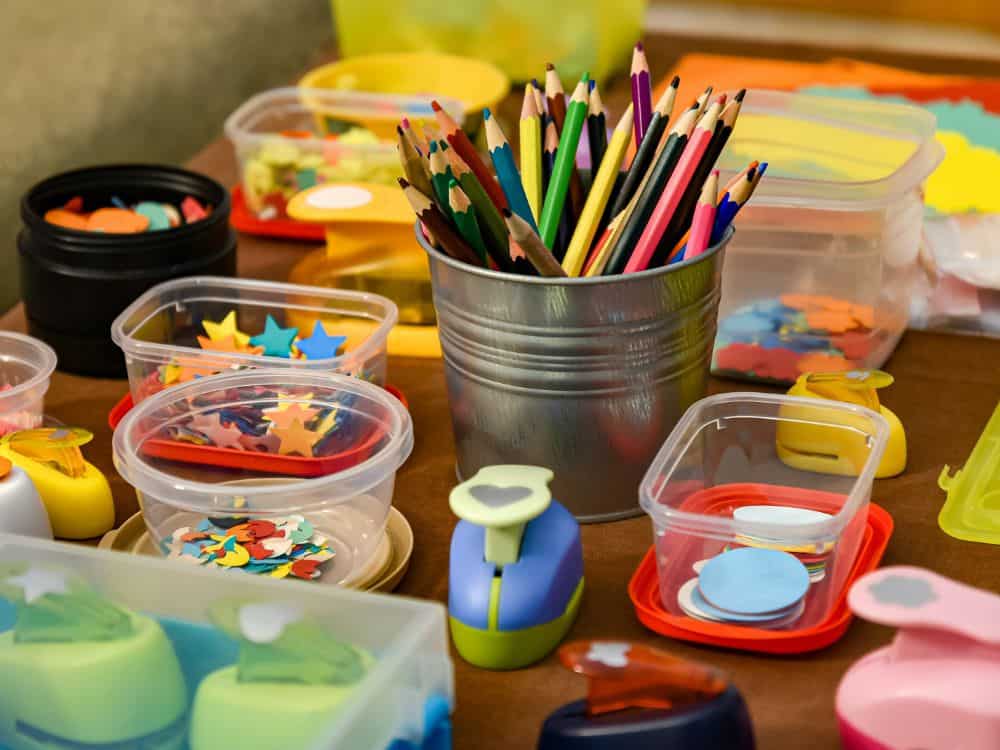
Let’s say your old Tupperware shouldn’t be storing food anymore but you don’t want to or can’t recycle it.
There are plenty of old Tupperware uses other than food storage.
Use old Tupperware as containers to store a wide variety of items throughout your house. If the lids still work, they could be an ideal solution for eco-friendly art and craft supplies or anything else you want to keep in some sort of order.
Even if the lids are kaput, you can still use the containers themselves to store small items in drawers or on shelves to keep your bits and bobs a little tidier.
Here are more ideas for what can you use old Tupperware for:
- Planters: A little paint on the exterior and some drainage holes—which are easy to drill into plastic—can turn old containers into ingenious eco planters.
- Zero waste gift wrapping: Give the Tupperware a coat of paint inside and out, add a little filling (cut-up newspaper works), nestle a small gift inside, and pop a bow or ribbon on the outside.
- Compost collectors: An old Tupperware container can give you a smaller, less intrusive way to keep food scraps corralled on the counter. Then, dump it into your indoor compost bin when you’re done prepping your meal.
- Showerhead cleaning container: Simply unscrew your showerhead from the wall, pop it in the Tupperware with white vinegar, and let it sit overnight to remove hard water deposits and revive your water pressure.
5. What To Do With Vintage Tupperware
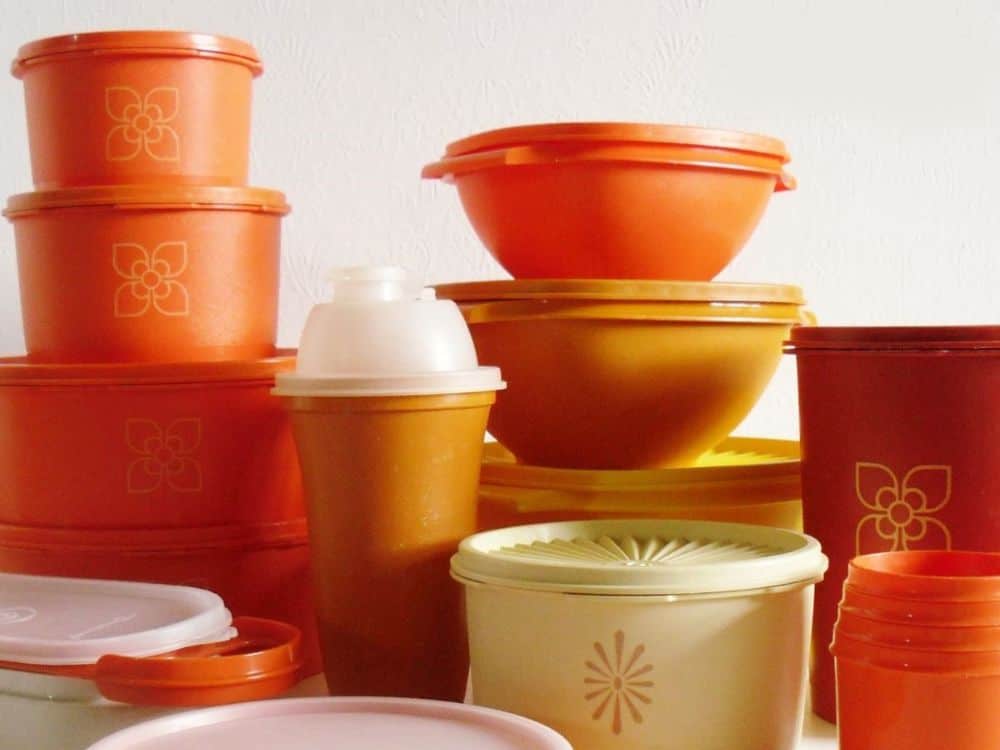
Sell it!
Wait, can you sell old Tupperware?
Generally speaking, no, but there are niche markets for rare, vintage items.
But wait, doesn’t vintage Tupperware have BPA? Is 70s, 80s, or 90s Tupperware safe to use?”
It depends on the purpose. Vintage options probably aren’t food-safe anymore, but can be used as decor piece in someone’s zero waste kitchen or home, so you might find a specialized buyer on eBay, Etsy, or similar sites.
6. Alternatives To Old Tupperware
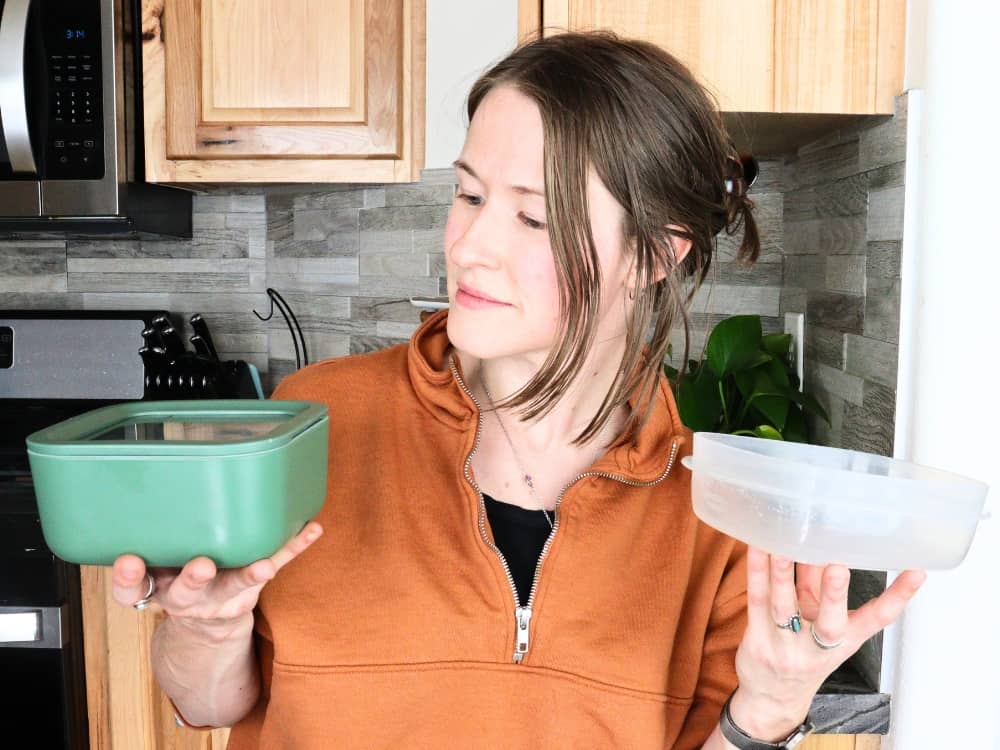
As for ways to upcycle Tupperware products that cannot be recycled or sold, the landfill may be your last resort.
Not ideal, but the good news?
It’s a learning experience and one that will hopefully lead you to find new and more responsible ways to keep your food fresh.
Opting for longer-lasting and fully recyclable plastic-free food storage containers made of glass and metal can eliminate a lot of the complications that come with plastic.
While the glass vs plastic debate is somewhat nuanced, glass is a straightforward, environmentally friendly way to part with this food storage option when you’re done using it (read: you can recycle it or reuse it safely indefinitely).
It also means the product wasn’t made from oil, helping you further limit your environmental impact.
Plus, storing your food might not require the full-blown container you’d expect. Knowing how to use beeswax wraps or just opting for a damp paper towel could be enough to keep produce fresh and the like.
Did you know we Have a Newsletter?
We cover the latest in sustainable living, fashion, zero waste, beauty, travel, finance and more…
Why Find Better Things To Do With Old Plastic Containers
If Tupperware poses so many potential problems to human health, why should we recycle or sell it?
Because the alternative is that it joins the other 300 million tons of plastic product waste generated every.single.year. For perspective, that’s about what the entire human race weighs.
If we continue, experts predict we will have 12 billion metric tons of plastic materials in landfills by 2050.
There, they will take anywhere from 20-500 years to break down, and considering Tupperware is often made of thick plastic, it likely sits on the higher end of that spectrum.
Of course, that’s assuming it actually makes it to the landfill and not into the ocean, where it will contribute to the annual death of one million marine animals and break down into some of the 70,000 pieces of microplastics the average person consumes in a year.
If you think last week’s mold-covered leftovers you forgot about sound gross, just imagine that.
While plastic products often have a less-than-perfect, responsible end-of-life solution, we can mitigate its damage by recycling and repurposing as much as possible.
Final Thoughts On What To Do With Old Used Tupperware
Finding safe ways to recycle old Tupperware can get complicated, but that doesn’t mean you shouldn’t try.
Supporting a circular economy means it’s so important we start paying attention to not just how we consume new products, but how we dispose of them—whether it be old clothes, old pillows, or that pile of yellowing plastic in your kitchen cabinet,
And once that plastic leaves your house, ensure it doesn’t come back, replacing it with safer food storage containers instead.
We’d bet that just about everyone you know has some old Tupperware products, so consider sharing this resource.
Pin these:
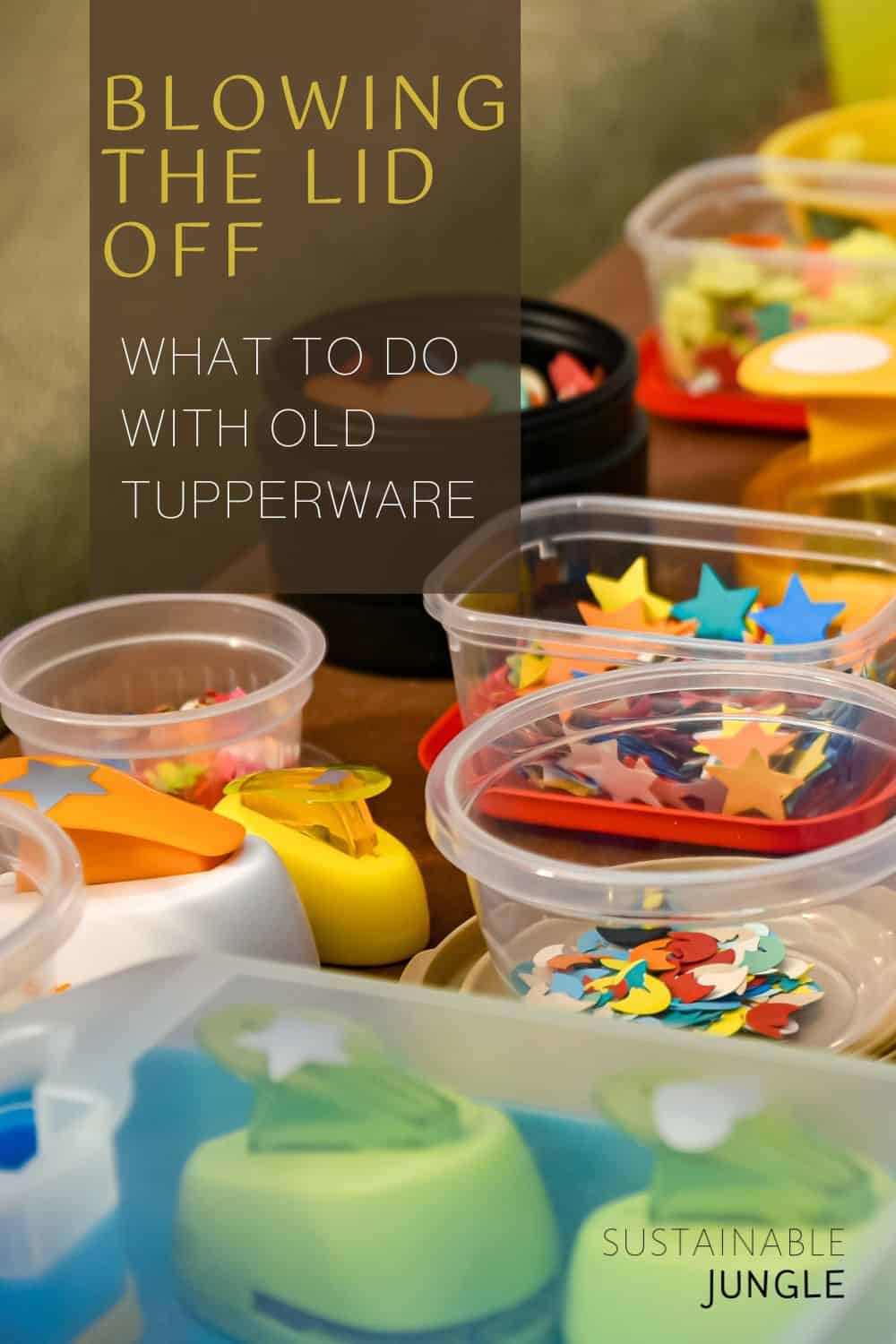
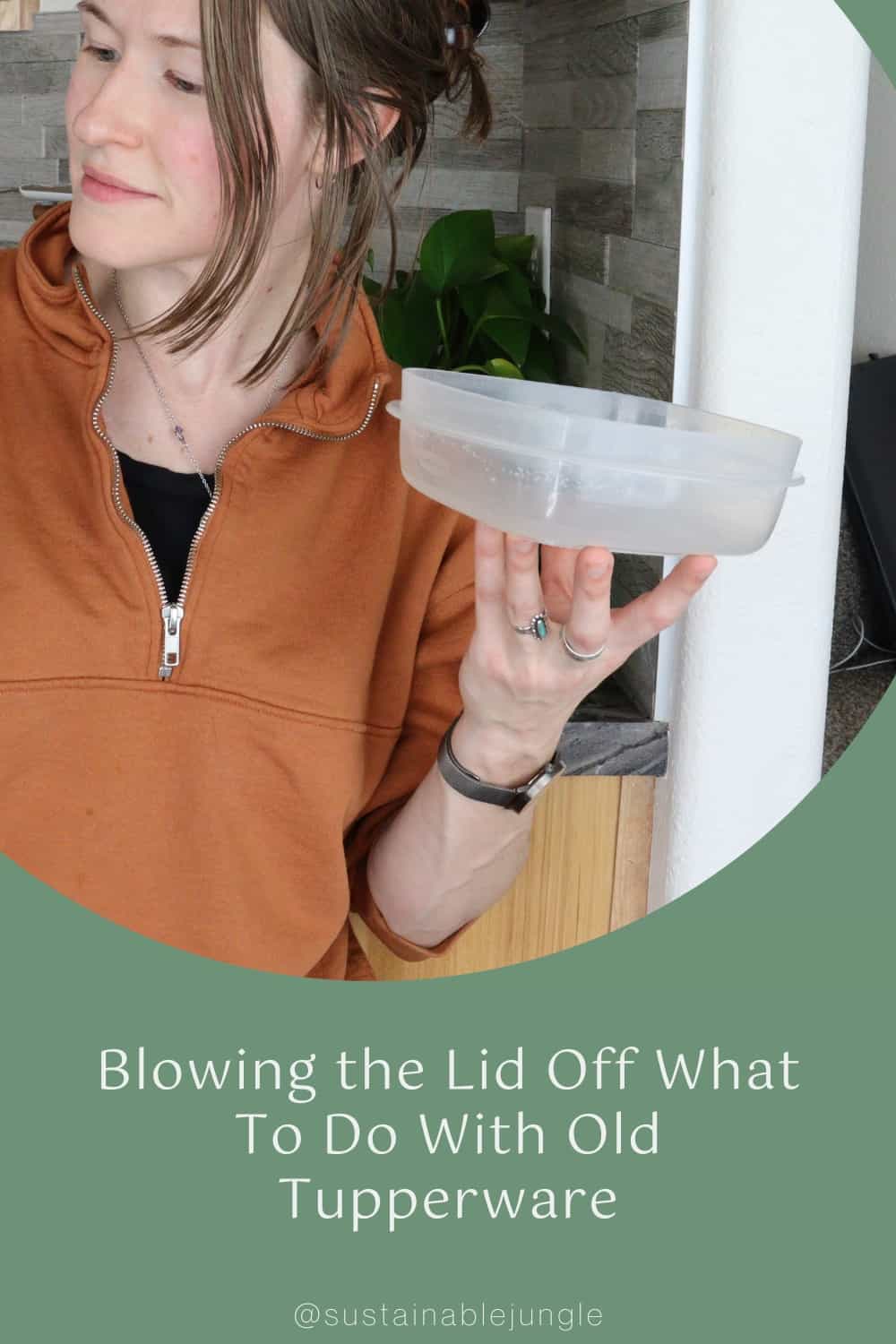

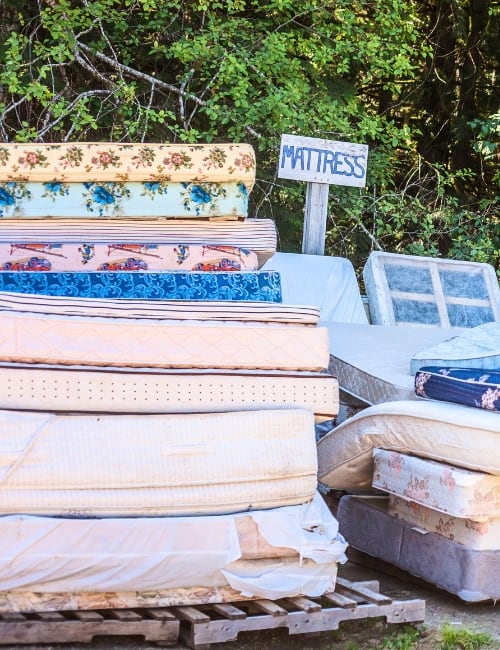
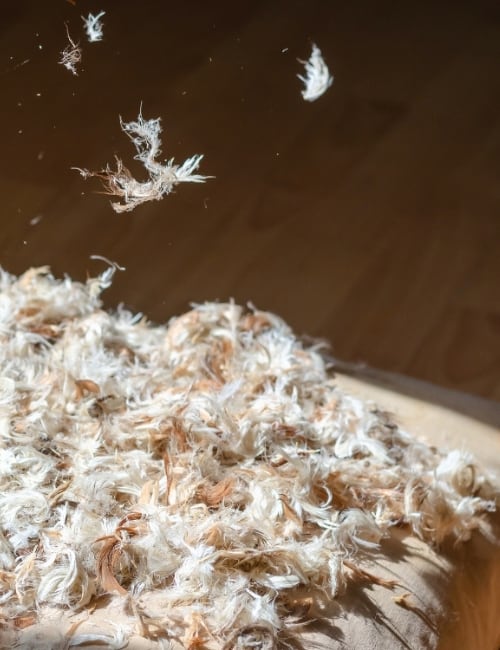

When we paid the extreme high prices for Tupperware 40 years ago one of the selling points was it had a lifetime guarantee.
I heard that Tupperware was going out if business and filing for bankruptcy. What say ye?
I was at a craft fair where a woman was selling Tupperware. I have an old piece
that I love the size of but have lost the lid. She said that I should be able to get
a lid replacement, but I’ve lost her name. Is it possible for me to get a lid replacement for a 7″ bowl?
Sondra Tornga
Hi Sondra, I’d suggest hunting around on ebay or Etsy! you might get lucky!
OK, this doesn’t tell me what I can safely do with my old (old) Tupperware food storage containers, which is what I came here to find out.
How if the Tupperware is vintage, and the surface is compromised is it safe to use it for other things? Won’t the toxic chemicals leach into the “crayons” or whatever you r using it for? Doesn’t make sense to me at all.
You don’t eat crayons so it should be fine. Store non edibles in them
How about giving it to your tupperware consultant, collecting all of it from friends and so on, as Tupperware recycles its own plastics quite happily. Please include this info in your report otherwise your information falls very short of being useful and responsible. All plastics manufacturers should do the same!
Another reason for buying Tupperware, rather than cheaper products